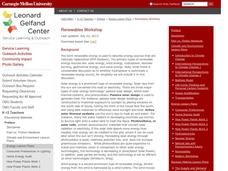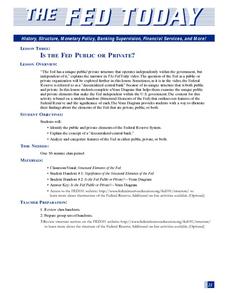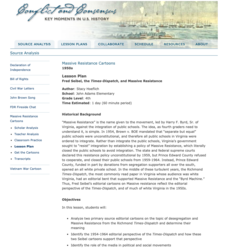Constitutional Rights Foundation
Options for Affecting Public Policy
Letter-writing, e-mail and telephone campaigns, petitions, marches, meetings, with lawmakers. Options for influencing elected representatives are the focus of resource that details how to craft each of these approaches to influencing...
Constitutional Rights Foundation
Federal Policy and Immigration
How is federal policy established? To gain insight into this complex and often messy process, class members read an article that uses information on attempts to establish public policy in immigration to illustrate the role proposed...
C-SPAN
The Role of the Executive Branch in Policy Making
Although the president of the United States does not have the power to pass laws, they can propose legislation, veto bills passed by Congress, and issue executive orders that bypass Congress. Six video clips show middle schoolers these...
Bonneville
Renewable Energy Panel
Plan a panel on public policy. On the first day of lessons, scholars identify local government planners and create questions to ask regarding renewable energy and infrastructure. On the second day, they conduct the panel and learn about...
Advocates for Human Rights
Civic Engagement and U.S. Immigration Policy
To conclude their study of immigration and human rights, class members create a civic engagement project centered on an issue of immigration and designed to influence US immigration policy. They examine examples of attempts to influence...
Foreign Policy Association
Public Diplomacy Online Lesson Plan
To build an understanding that there are many perspectives of global issues and that an individual's perspective is influenced by background and experience, class members assume the identity of a person in the global community and...
Constitutional Rights Foundation
Conducting a Panel Discussion and Civil Conversation
The final lesson plan in an 11-session study of immigration asks class members to engage in either a panel discussion or a civil conversation of the controversial legal and policy issues they have investigated as part of the unit.
PBS
Decoding Media Bias
Alternative facts? After watching the We The Voters film, "MediOcracy," viewers compare how cable news outlets CNN, Fox News, and MSNBC report the same story about politics or public policy. After a whole-class discussion of their...
National Endowment for the Humanities
“From Time to Time”: Presidents and Communicating with the Public
While the Constitution requires a "State of the Union" address, it doesn't give many details. In fact, it wasn't until Woodrow Wilson that the periodic update to Congress was given in-person. Using primary sources, recordings and...
Carnegie Mellon University
Renewables Workshop
Youngsters examine resource maps to find out which states are using solar and wind power and discuss as a class various other renewable energy sources. They use a provided data table to record pros and cons to each technology, build and...
School Improvement in Maryland
Affirmative Action
Do the government's affirmative action policies promote equity in the United States? The Fourteenth Amendment to the US Constitution and affirmative action policies come under scrutiny in an activity that asks class members to...
Social Media Toolbox
Verification
When you're putting together a great story, you've got to consider the source! Scholars discover the dangers of errors in reporting during the 14th activity in a 16-part Social Media Toolbox series. Groups collaborate to create a source...
Newseum
Weighing the Arguments
To understand how personal perspectives can affect policy and politics, scholars examine the woman suffrage media map and historical artifacts to analyze arguments for and against women's suffrage. Class members then take on the role of...
Federal Reserve Bank
Is the Fed Public or Private?
The Federal Reserve System as a decentralized central bank can be a difficult concept for learners to grasp. Help them get a firm handle on this concept using this resource, in which class members work as a group to identify the...
Center for History Education
How Did the Public View Women’s Contributions to the Revolutionary War Effort?
Calling upon the legacies of Joan of Arc, Elizabeth I, and Catherine the Great, Esther Reed rallied Southern women to support the American Revolution. Using a broadside by Reed and other primary sources, such as poetry, young historians...
Newseum
You Can't Say That in School? The Case of Lee v. Weisman
The Supreme Court case Lee v. Weisman is the focus of a lesson that examines religion in public schools. After reading a summary of the case and before reading the verdict, pupils use their knowledge of the First Amendment to discuss the...
Learning for Justice
Challenging Gender Stereotyping and Homophobia in Sports
Young learners are asked to challenge what they see as stereotyping and homophobia in sports and the arts. Participants read an article about sexual orientation in the NFL and statements from public figures like Theodore Roosevelt. They...
University of Wisconsin
Analyzing Presidential Campaign Propaganda
Campaign propaganda has evolved from 1952 through the presidential election of 2008. A social studies activity prompts class members to analyze the devices used in ads and political cartoons, noting strategies they believe would work to...
Alabama Department of Archives and History
Women of the Movement: Civil Rights Movement in Alabama
Many know of Rosa Parks involvement in the Civil Rights Movement, but who were other female leaders? The lesson focuses on female Civil Rights leaders and their achievements. Scholars complete research, participate in group discussions,...
National Endowment for the Humanities
The Metamorphoses and Genesis: A Comparison of Creation-Flood Stories
Creation and destruction. Scholars use a Venn diagram to compare the creation story in Ovid's The Metamorphoses with that in the book of Genesis. Pupils then note differences between the two texts and offer suggestions for why the texts...
Federal Reserve Bank
The Story of the Federal Reserve: High School Lesson Plan
Is there a bank for the banks? Pupils analyze the complexities of the Federal Reserve system by breaking it down into easy-to-understand sections. Step-by-step investigation using flow charts and graphs of how the monetary system works...
Roy Rosenzweig Center for History and New Media
Fred Seibel, the Times-Dispatch, and Massive Resistance
A instructional activity challenges scholars to analyze editorial cartoons created by Fred Seibel, illustrator for the Times-Dispatch, during the Massive Resistance. A class discussion looking at today's editorial pages and Jim Crow Laws...
Anti-Defamation League
Exploring Solutions to Address Radical Disparity Concerns
The deaths of Michael Brown, Eric Garner, and Tamir Rice, and the protests that followed the 2014 shootings, are the focus of a current-events activity that asks class members to brainstorm and research possible strategies to address the...
Common Sense Media
Cyberbullying: Crossing the Line
Teach pupils to identify different forms of cyberbullying, including harassment, deception, “flaming,” and threats to safety, as well as how to handle a situation in which cyberbullying might be involved.
Other popular searches
- Public Policy Debate
- Public Policy Public Concern
- American Public Policy
- Shaping Public Policy
- Create Public Policy
- Public Policy Making
- Effecting Public Policy
- Influencing Public Policy
- Public Policy Lesson Plan
- Effect Public Policy
- Media Public Policy
- Creating Public Policy

























